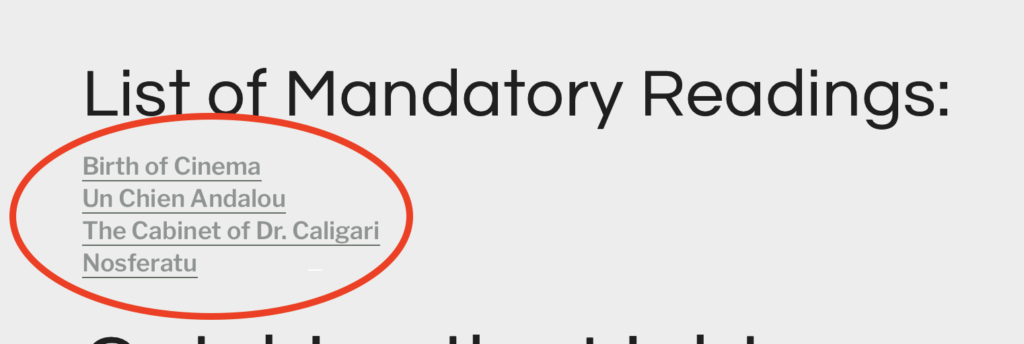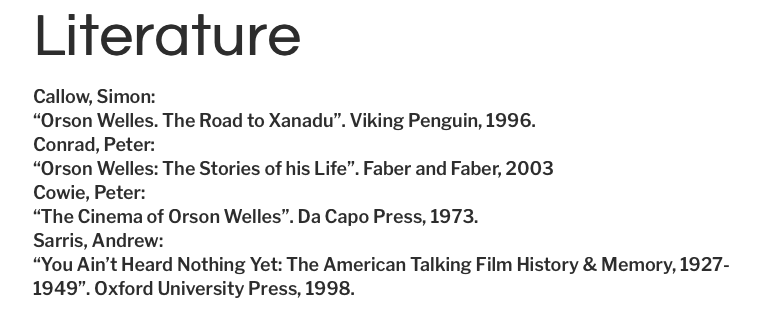Welcome Message
Welcome to the course COMM 220 Introduction to History of Film
In this brief introduction, I will discuss the contents of the course, the learning material (readings and audiovisual material), and the grading elements.
But before I would like to introduce myself.
Personal Introduction
My name is Jose Carlos del Ama.
Although I originally come from Spain, I have spent the most important part of my life and academic career in Germany. I received my PhD from the Johannes Gutenberg University in Mainz.
Before I came to the United States in 2003, I had been teaching and researching in Spain at the Universidad de Navarra (Pamplona) and in Germany at the above mentioned university.
My emphasis areas of teaching and research are
Public opinion,
Research methods,
Mass communication,
New technologies,
Filmic narrative.
More information about the instructor, you can become in this link:
With this background and vital experience, you can expect a cocktail of accents when I speak in English. I have recorded some brief audio material to introduce some of the concepts of the course or discuss stylistic and thematic elements of the genres and filmmakers this history of film covers. If you have any difficulty understanding the audio material, please, contact me.
Learning Material
We will not have any particular textbook in this course. Instead of that, I have created learning units with different contents: online lectures, audio files, book chapters, journal articles and audiovisual material. Again, this is a reading intensive course. You need to know the readings in order to success in this course.
You will find the mandatory readings at the beginning of every learning unit. See the example:

Example:

About the Contents
The main goal of this course is to help you gain an idea of the historial development of cinematographic art.
Introduction to history of film, like any other historical survey starts with the origins of cinema. The course discusses the first attempts to find expressive ways with the aid of the new technology in European and American silent movies. The, the course focuses of the development of the film industry on the basis of the most popular genres during Hollywood’s Golden Age. In the last part of the course, we move to Europe to analyze the most important stylistic trends in European Cinema after World War II and the avant-garde movements in the postwar time.
Three weeks courses are very intense learning experiences. In the case of a historical course, we need to cover a notable amount of information in a very limited amount of time. Therefore, I tried to be as flexible as possible with regards to contents. My ambition is not to cover the whole program “no matter what”. I prefer you to develop an understanding of the language of cinema and the potential of filmmaking to create meaning. With these tools you have keep exploring the fascinating history of cinema.
The last learning unit this course will cover is the one dedicated to the Italian Neorealism. You will find more learning units in the “Course Contents” tab of our Web-site’s main menu in case you are interested in some contemporary cinema movements. Again, those learning units are NOT covered by the exams.
Learning Modules
The learning modules you will find in the course contents folders are the key to success in this course. Thus, it is important that you are using them properly.
Every learning module contains three basic types of material:
- Online Lectures
- Audio files
- Book Chapters and Journal Articles
- Audiovisual Material
Please , be aware that I have added some learning units that WILL NOT BE COVERED by the exams. My goal with this Web-site was to offer you learning material not only to success in this course but also to help you explore different areas and authors that are relevant in the history of film. Specifically, the learning units that midterm and final exam WILL NOT COVER are the ones dedicated to
- the film musical genre,
- Alfred Hitchcock,
- Billy Wilder,
- and the American college generation.
Mandatory Movies
You will have to watch a series of mandatory movies. Those movies are mentioned in each learning unit – and also in the film collection. Some of them, the older ones, are available for free in online platforms, such as YouTube. In those cases, I have streamed them into the course’s Website, so that you can find them in the different learning units. In other cases, you will not be able to find them online for free. Most of the those films are available in the public libraries of the area. You can also rent them in any of the popular video platforms (iTunes or Amazon Video) for a moderate price (around $3).
Grading Elements
- Midterm Exam 35%
- Final Exam 45%
- Participation 20%
The midterm and the final exam will have the same format: Multiple choice and short essay questions. You can perfectly answer each essay question in 250 words. The final exam covers the contents of the whole course.
You will have 3 hours to complete both the midterm and the final exam. All the examinations will be available for two days. Please, be aware that time starts running when you begin the assessment.
I am completely aware of the overwhelming amount of information we have to cover in only three weeks. For this reason, I will be as flexible as possible and keep the exams open for two days, so that you can take it whenever you have the time. Still, take into account that the time to complete the assignment is limited. Once you begin the test, time will start running. Follow the instructions you will find in the assignments’ page.
The examinations will be available following dates:
- Midterm – January 10 (Friday) and 11 (Saturday)
- Final Exam – January 17 (Friday) and 18 Saturday)
The participation grade will be based on the discussions forums and the quality and quantity of your entries. Every week, I will post discussion questions related to the mandatory movies in this course. The forums will be open Monday through Friday.
Interaction with the Instructor
Please, use the “Contact the Instructor” area in the course’s main menu to ask questions related to this course. I am in Blackboard Learn several hours every day and check regularly your messages.
I will also schedule individual virtual meetings for those students who want a more personal interaction with the instructor. Please contact me through the Blackboard Learn message system to make an appointment.
Good luck!
